Those who are fond of watching detective serials and movies want to become a detective in the future as well. The thrill of deducing never really leaves us especially after getting to know the character of Sherlock Holmes. But this dream seems to be forgotten and we will work to more realistic goals. In recent years, due to the increased rate of crime, there is a greater need for detectives to solve them. This is the reason why some police officers are trying to be like Sherlock Holmes. For those of you who still haven’t given up on your detective dreams, here is some information on the exciting career of being a detective.
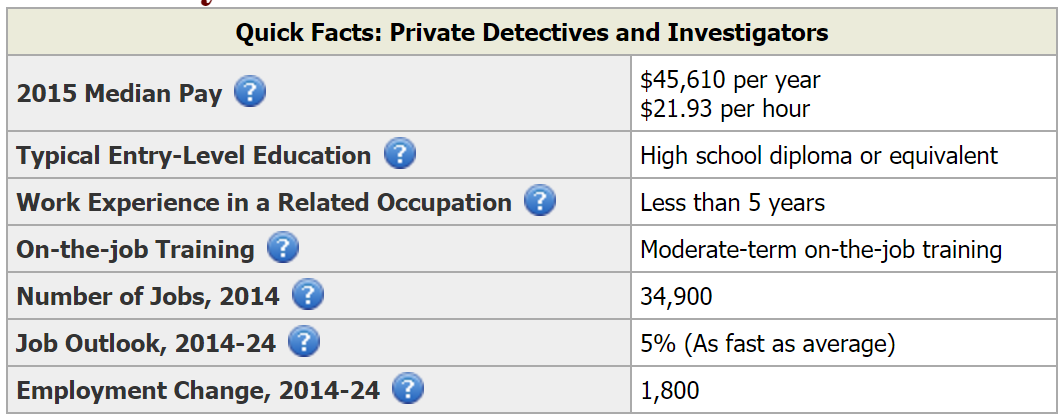

Table Of Contents
- Average Detective Salary
- Detective Career Outlook
- How To Become A Detective
- Detective Job Description
How Much Does A Detective Make
The basis of a detective’s salary at first will depend on his or her employer. An investigator who is employed by the state earns more than a private one in most cases. This is mostly due to steady work that they receive compared to the intermittent work of a private detective.The reason behind this is they always have work to do compared to a private detective. The national average that is earned by a detective who is employed by the state is $76,000. Whereas the average salary for a private detective can be around $45,000. The factors that affect a PI’s salary will be discussed later. For now, let us look at the factors that affect the salary of state employed investigators.
[asd_program_button /]Size of population
The income of a detective depends on the population of a city the same to that of the police officers. The number of cases to be handled by a detective increases if the city is more populated. Thus, the increase in salary. The crime rate also affects the salary of an investigator. For example, the average salary for someone who is in the LA police department will range from $44,000 to $88,000. Whereas, a member of the Miami Police department usually get $86,000 to $107,000 salary.
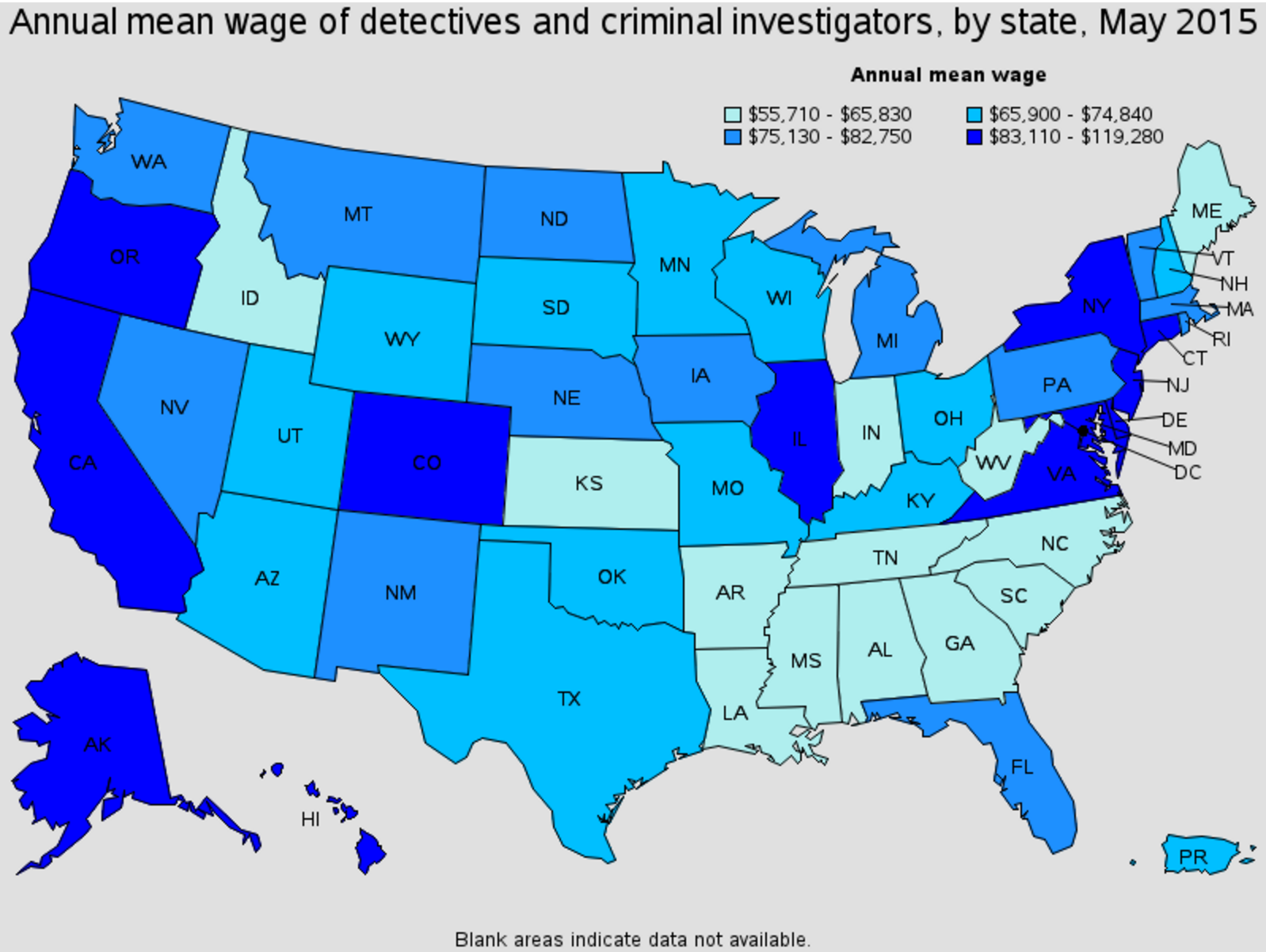
Location of job
The location is closely related to the population of the place and the crime rate. However, another factor comes into play in such conditions – cost of living. A detective will be paid higher if the cost of living in that certain location is higher. Private investigators will also have this case. District of Columbia, Alaska, and New Jersey has 6-figure salaries and District of Columbia can pay as much as $116,000.
Education background
For any police job (except at the federal level), a high school degree is sufficient. States have different rules but a higher education certificate is not necessary in some states. However, some states and departments have started to realize the importance of higher education and thus are paying officers and detectives a percentage higher above the base pay if they have a degree after high school. The degree could be associate, bachelor or master’s. You will be paid more depending on your degree.
Work Experience
Like any other job, you will get earn as an investigator if you stay in the field long enough. Usually, people see an increase of up to $15,000 with 20 years of experience if they do not get promoted. But if you are promoted as a Police Chief, you will be paid about $180,000 per year.
State College Private Investigators
A private investigator’s salary depends on the number of cases he or she takes and solves. The factors that affect the salary as mentioned above include the location, amount of discretion needed, amount of danger involved, required extra equipment and other many things. Clients usually present their problem to the investigator and then it is up to them to quote a price for the job.
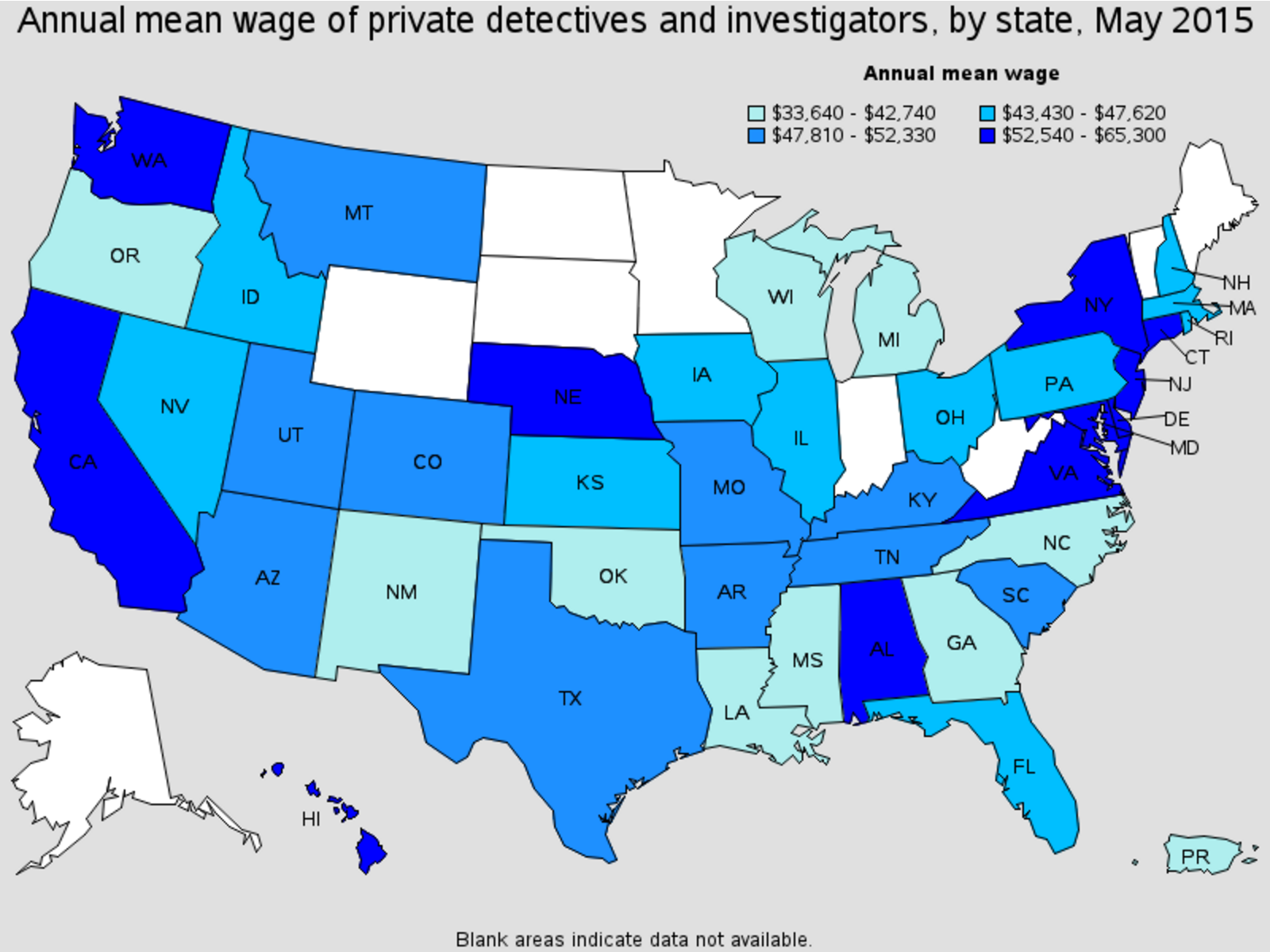
As you can see, the income of a state-employed detective is steady and can be increased by various means. The salary of a private investigator cannot be determined and by being famous it can be increased. The path to choose will be determined based in the financial facts you have.
State College Detective Career Outlook
First, let’s talk about the growth in the fields. There were about 106,000 public detectives or criminal investigators on record in 2015. Meanwhile, private investigators who do the same job were only 30,000. In this industry, the predicted growth of private detectives is about 15%. Meaning to say, in 2025 the new jobs open will reach 1,500. Such growth rate follows the 5% average growth rate in all other sectors. On the other hand, for public investigators, this figure is at 4%. This means there is going to be around 4,000 more jobs as a criminal investigator by 2025. This too is an average rate of growth.
[asd_program_button /]The increasing population is the reason behind this steady increase in employment. As the population increases, more people need to be protected and more criminals need to be caught. However, with stricter laws and more advanced technology being use, the crime rate isn’t increasing that significantly. Hence, there is a balance in each other, which leads to average growth in both careers.
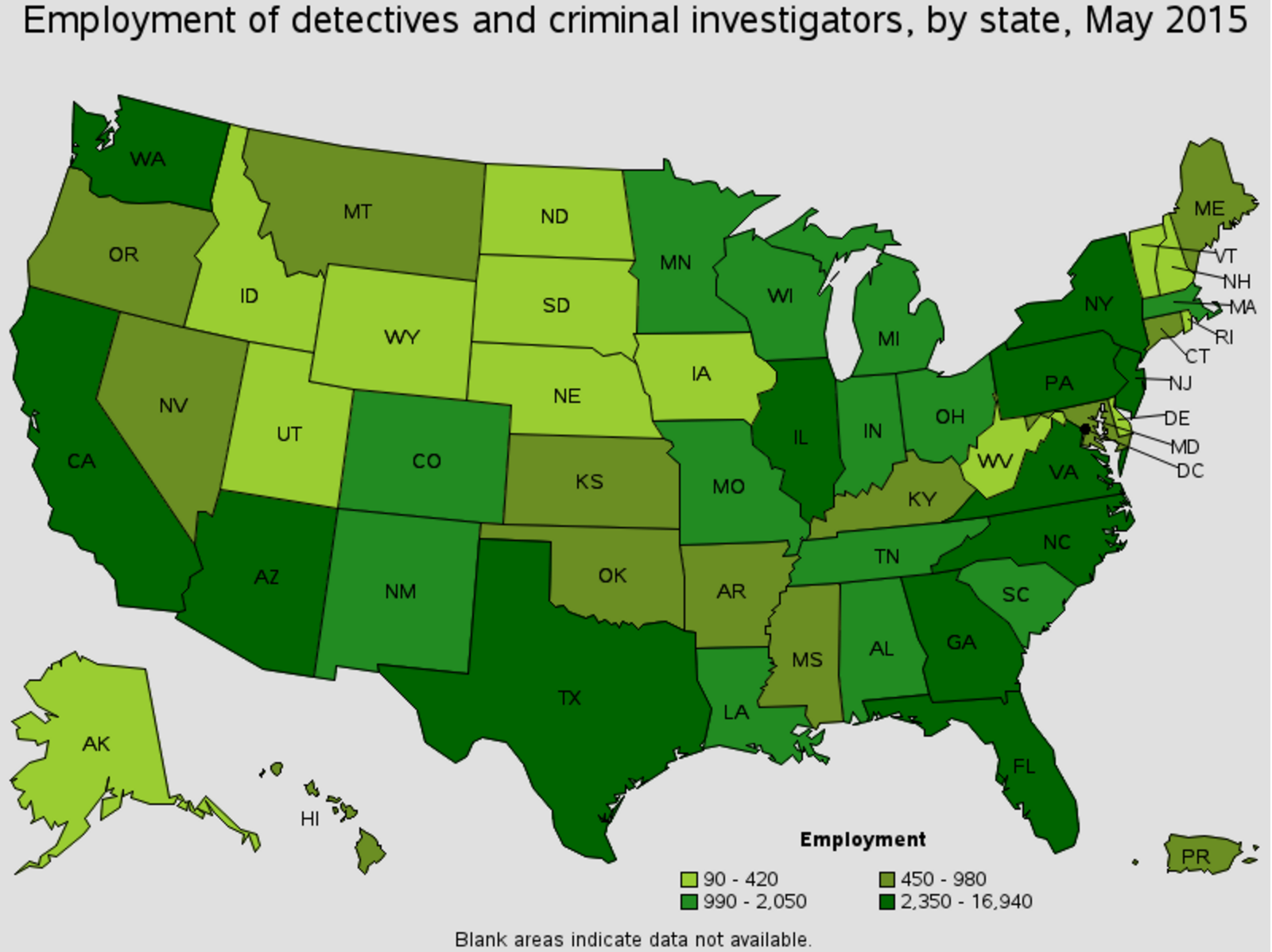
In terms of location, Texas, California and New York have the highest number of Criminal/Law Enforcement Investigators. Western states and Texas show more employment here than the eastern ones. Private detectives in California, Texas and Florida with the southern part are higher in number compared to the northern ones.
Let’s see what are the industries that hire these professionals most. As clear as day, The Local, State government and the Federal branch employ the most number of criminal investigators. Whereas private detectives are being hired by Security Services, Consulting services and the local government for consultation purposes on a few cases.
Financially speaking, criminal investigators do get paid more than private ones. Their annual average salary is $80,000 (Criminal investigators) and that of Private investigators is around $52,000. When combining the aspects of geography and finance, the District of Columbia, Alaska, and New Jersey is paying most the Public investigators. Private detectives were paid most in Alabama, Nebraska, and New Jersey.
Compared with the different industries, private industries where they employ most do not pay the highest. SinceElectromedical, Navigational, Power generation, Metal Product forming and other such industries have to protect sensitive information that is why pirvate detective are paid most by them. For public investigators, they are paid most by federal agencies, postal services, and educational institutes.
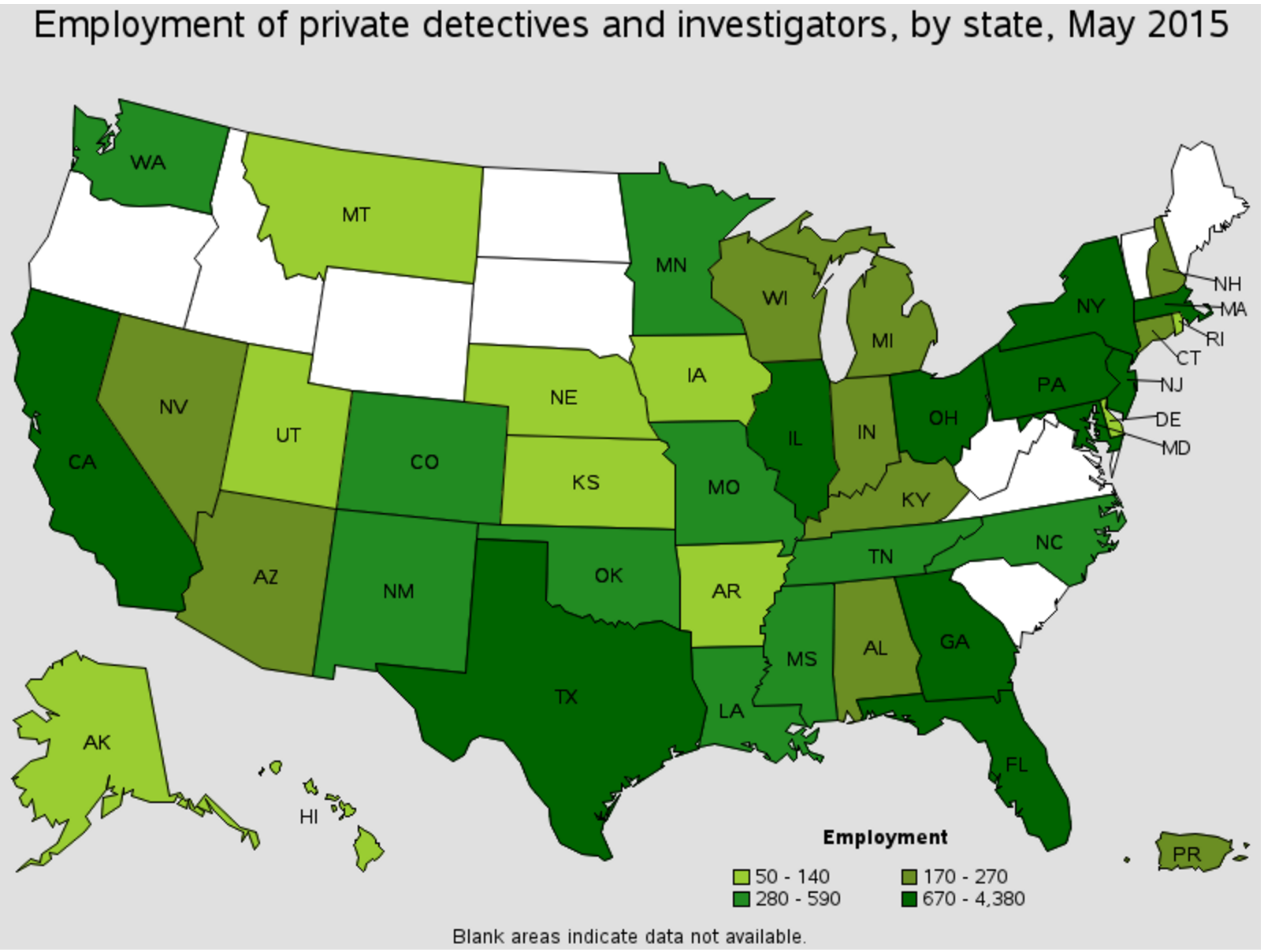
How To Become A State College Detective
Detectives come in two kinds. General public can hire some private investigators to investigate certain things. Some of them are employed by the government and get this post after their promotion as a police officer. We are going to explore here the different avenues.
[asd_program_button /]Be a High School Graduate
A detective is known for his deduction skills, and it is due to such that he is promoted to such position. Thus, a general way in becoming a detective is to first complete high school and get into the police academy to become a police officer. To become a private investigator, a high school degree is a must too.
Get Yourself a Bachelor’s Degree
A bachelor’s degree isn’t really necessary in most cases when becoming a police officer. Although some officers would like to have other means of employment right after retirement. A bachelor’s degree is also required to pursue any jobs at the federal level or become a detective.
In most institutions, you will need a bachelor’s degree in psychology, law, or criminal justice to be able to land a job as a detective. If you have an associate’s degree, you will need at least 5000 hours. On the other hand, someone with a bachelor’s degree needs only 4000 hours of training.
Get enough experience
Professional experience as an investigator is required in order to become a professional detective. You can find several ways to do so. But in most cases, it will require you to be employed by the government. You will be regarded as a person with experience if you worked as a criminal investigator or an arson investigator. Other than these, you can also choose to Public defender’s office investigator or a licensed repossessor.
There might be variations in the required experience in the state you’re applying in. A state might require at least 3 years of experience, but in some it could be as long as 5 years.
Acquire a license for your guns
Investigators that aren’t licensed by the state aren’t allowed to carry firearms without a permit. There are several firearms with strict requirements such as completing a full training course before the permits are issued. Therefore if you want to own a firearm while working as an investigator, completing the training course is necessary to get your own permit.
Undergo a Pennsylvania licensing test
After completing all the education and experience requirements, you are required to undergo a state licensing test. During the exam, you will need to answer questions in multiple choice, usually regarding about state laws and several other procedures. Those who are looking to be a private detective will need to take this test. After passing this test, you are officially a private investigator with a license.
Insure Yourself
Since investigating can sometimes be a dangerous line of work, it is important to get insurance done. This is generally medical insurance of about $10,000. But since you’re carrying a gun with you for extra protection, and you will have to insure the gun as well, getting a higher amount will be an ideal choice.
By completing these steps, you’ll be good to go. Your steps towards becoming a successful detective is finally within your reach. However, don’t forget that being a detective would mean exposing yourself to danger. If you are still up for it, find out all the education requirements in detail and get started on them right away!
Responsibilities of Being a Detective in State College
Crime Scene Investigation
One of the main duties of a detective is to analyze a crime scene and deduce certain assumptions from it. It will also include searching for clues and collecting evidences. They are supposed to take anything into custody that may look suspicious and may be used for clues or in the court later. To help them deduce a lot of things more quickly and easily, the forensic department will sometimes offer them assistance. To collect more clues and evidence, detectives will need to go door to door and ask any possible eye witnesses.
[asd_program_button /]Criminal Research
One of the core aspects of a detective’s duty is doing research and groundwork regarding previous cases. Through this, they can get to the mind of a criminal and discover any hidden clues and patterns. Often, research into the past and previous case files give them an idea or a clue as to how the current culprit might be operating. In cases of serial killers or ‘copycats’, research helps a lot. This also helps detectives take down drug cartels by allowing them to identify any tactics being used. Other general research can help them narrow down a suspect better or deduce the crime scene in a more efficient way.
Narrowing down suspects
The whole objective of everything that a detective does is to serve justice to the person who has committed the crime. However, they will need to come up with a list of suspects first. The list could be long, including up to a hundred people, or short – sometimes none at al. With the help of evidence, research, statements, and forensic studies, they are able to come up with such list. By means of getting statements from suspects, detectives are able to narrow down their list. Once the list is narrowed down, they will then proceed to gathering evidence or having the suspect admit to his crimes.
Testifying In Court
Lastly, detectives will see to it that justice is served properly. To help with the process, they are sometimes summoned to the court to testify against the suspect(s). They will often describe the scenario of the crime, and present evidences that will prove the crimes of the criminal. There are also cases where the one at fault will be escorted by the detective.
State College Private Detectives
All the above duties were that of a public detective or a law enforcement detective. Keep in mind that the job of a private detective isn’t as easy as it seems. They are supposed to carry out their client’s wishes to the best of their abilities as far as reconnaissance is concerned. But there are limits which they shouldn’t go beyond when carrying out their duties. Some of the reasons why private detectives are hired include doing background checks, tracking finances, and even collecting clues and evidence to be used against a certain person. They should never act in a way that they can be easily recognized as a detective in public. Detectives are also prohibited from arresting an individual.
managed to get a most things right. However, the roles and responsibilities that detectives carry aren’t as easy as they seem. Such things aren’t even shown on the TV. Detectives should make sure to find any clue they could get since a lot of people’s lives lie on them. If you think being a detective is the right job for you, then you should do research about it now!
